
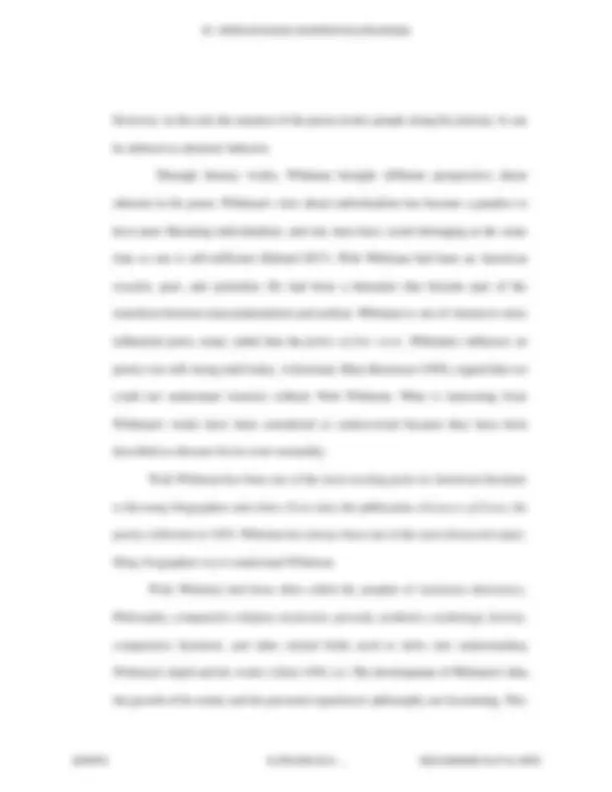
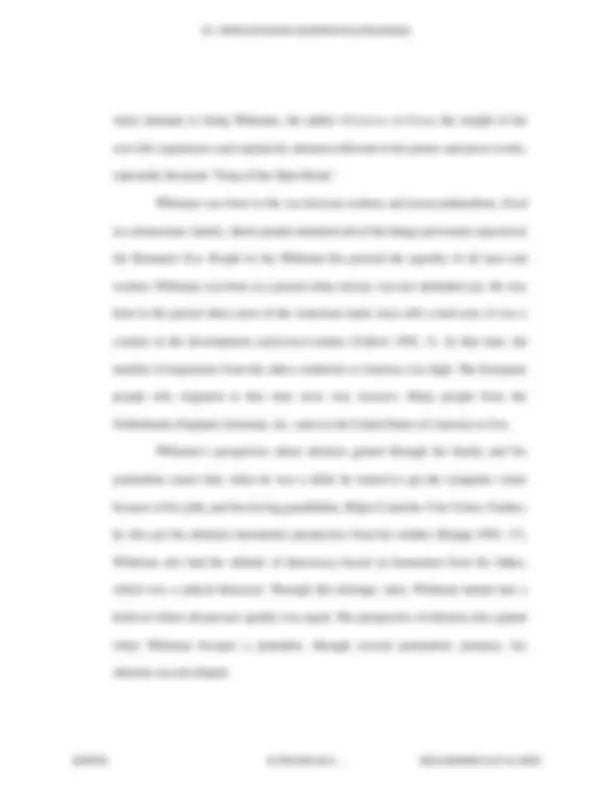
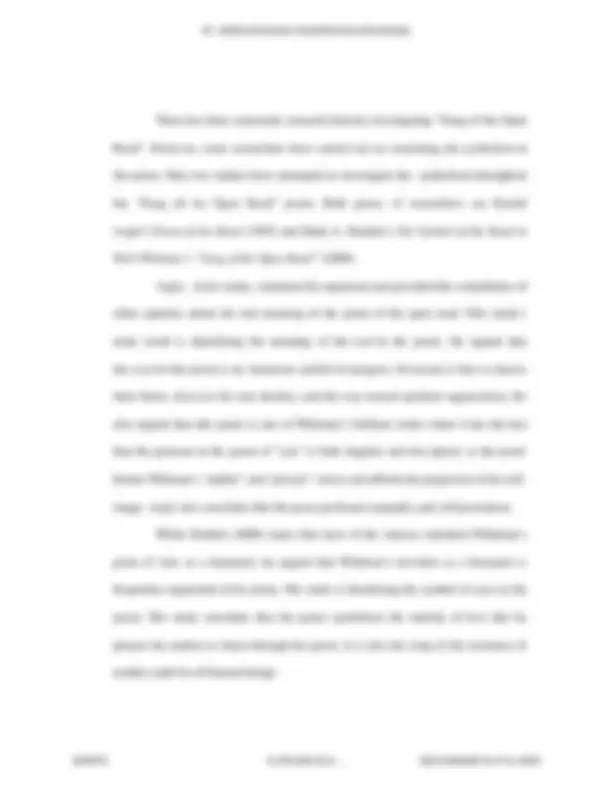
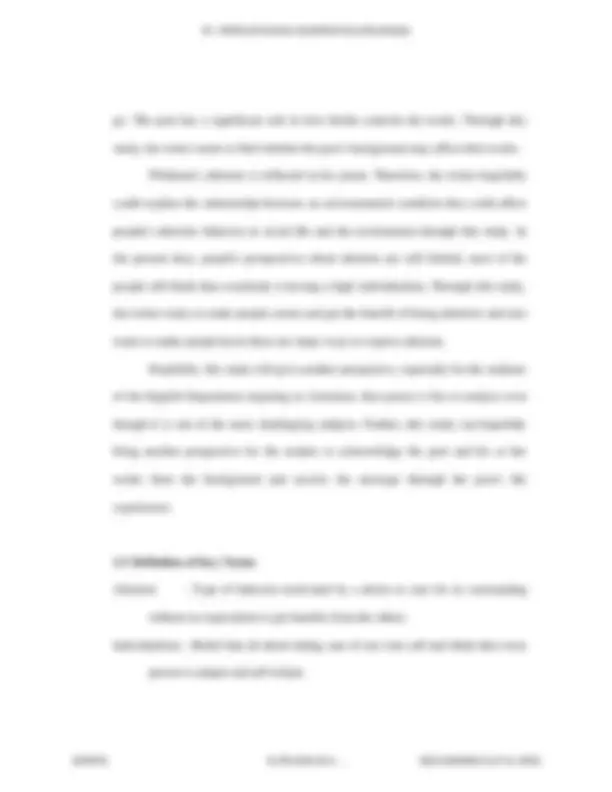
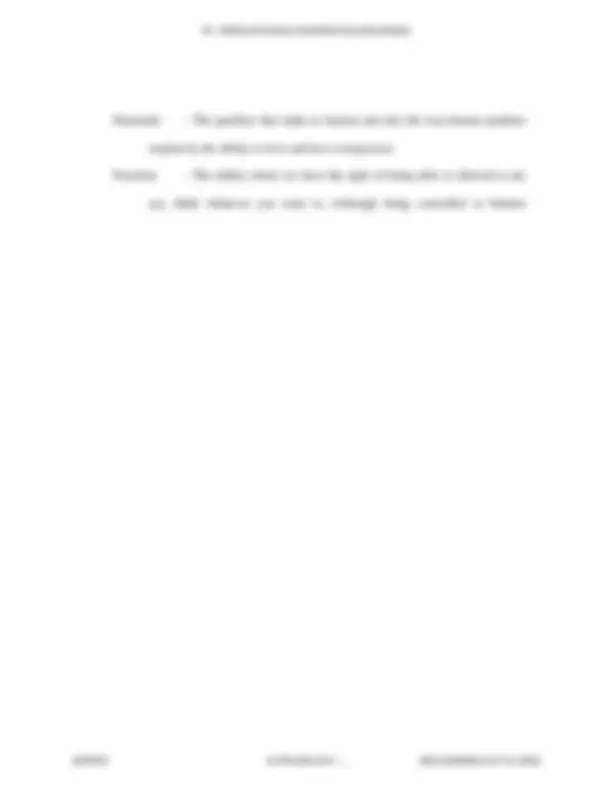


Study with the several resources on Docsity

Earn points by helping other students or get them with a premium plan


Prepare for your exams
Study with the several resources on Docsity

Earn points to download
Earn points by helping other students or get them with a premium plan
Community
Ask the community for help and clear up your study doubts
Discover the best universities in your country according to Docsity users
Free resources
Download our free guides on studying techniques, anxiety management strategies, and thesis advice from Docsity tutors
This study investigates the relationship between Walt Whitman's life experiences and the expression of altruism in his poem 'Song of the Open Road.' Through the application of expressive theory, the research aims to shed light on how Whitman's historical background influenced his poetic work and promoted altruistic values.
What you will learn
Typology: Study Guides, Projects, Research
1 / 9

This page cannot be seen from the preview
Don't miss anything!






1
1.1 Background of the Study Altruism is one of the principles or moral practices that concern more for the happiness of the surrounding like other human beings or animals rather than us. That is a virtue that consists of the cultures or traditions that the concept of altruism or others should be directed between cultures and religions. Auguste Comte, a French philosopher, coined the word ‘altruism’ coined for the antonym of ‘egoism.’ Generally, altruism consists of many forms of cooperative behavior, such as mutually beneficial, or the opposition of selfish, or kind of personal sacrifices in care for the family, friends, etc (Montanye 2018, 1-19). In the development of prosocial behavior in human relationships, altruism has been categorized with several stages. According to Ma (2017), there are ten stages within the evolution of altruism based on the taxonomy with the hierarchical structure defined in terms of altruism. Each stage differentiates on how an individual expresses their selflessness regarding a specific environment. Literary works are one in every one of the contents that would express altruism. It may also be considered jointly of a single lifetime's expressions, and therefore the environment surrounds it. The way or the thoughts of a private is seen through the language that he/she uses within the works. There is a connection between literature and life that's very intimate and makes it dynamic. Even ordinary
books become literature when the books within the books give us the thought about the relation between us and the world. Literature gets a universal appeal only if it's not just fantasy but goes beyond it by relating itself to life. Regarding altruism which is the feeling of selflessness, literature is believed to draw in the reader's attention: empathy, imagination, emotions, etc. individually, and it can expand the capacity of interpretation (Taras 2009, 1). Since literary work is an individual product, the next element that is also important is the poet or the artist. The work of literary products is directly or indirectly related to the poet’s life events, ideas, or material things. The audiences come as the element in the final (Purohit 2013). Meyer (Mike) Howard Abrams (1971), an American literary critic, introduced the four oriental critical theories covering the entire English literary theories and criticism. Abrams stated that nothing exists than text, author, and audience. He stated that any form of theories must fit into one of the four categories. Four categories that Abrams held in the literary theory are; Mimetic theory, Pragmatic theory, Expressive theory, and Objective theory. The focuses of each theory are different, but all of them are based on the text itself. This study is mostly going to focus only on the expressive theory concerning the text-author relationship. The literary work that will be the object of this study is Walt Whitman’s “Song of the Open Road” that is going to be related to altruism. Because in the poem, the self- centered expression is dominating throughout the poem by the use of the pronoun “I.”
study attempts to bring Whitman, the author of Leaves of Grass, the insight of his own life experiences and explain his altruism reflected in his poems and prose works, especially the poem "Song of the Open Road." Whitman was born in the era between realism and transcendentalism, lived in a democratic family, where people idealized all of the things previously rejected in the Romantic Era. People in the Whitman Era praised the equality of all men and women. Whitman was born in a period when slavery was not abolished yet. He was born in the period when most of the American lands were still a rural area. It was a country in the development, unfinished country (Callow 1992, 3). At that time, the number of migrations from the other continents to America was high. The European people who migrated at that time were very massive. Many people from the Netherlands, England, Germany, etc. came to the United States of America to live. Whitman’s perspective about altruism gained through his family and his journalism career that, when he was a child, he started to get the sympatric virtue because of his jolly and fun-loving grandfather, Major Cornelius Van Velsor. Further, he also got his altruistic humanistic perspective from his mother (Knapp 1993, 17). Whitman also had the attitude of democracy based on humanism from his father, which was a radical democrat. Through this heritage, later, Whitman turned into a believer where all persons' quality was equal. The perspective of altruism also gained when Whitman became a journalist, through several journalistic journeys, his altruism was developed.
There has been systematic research directly investigating “Song of the Open Road”. However, some researchers have carried out on examining the symbolism in the poem. Only two studies have attempted to investigate the symbolism throughout the “Song oft he Open Road” poem. Both pieces of researchers are Harold Aspiz’s Poem of the Road (1995) and Huda A. Hashim’s The Symbol of the Road in Walt Whitman’s “Song of the Open Road” (2008). Aspiz , in his study, contained his argument and provided the compilation of other opinions about the real meaning of the poem of the open road. This study’s main result is identifying the meaning of the road in the poem. He argued that the road in this poem is an American symbol of progress. Everyone is free to choose their future, discover his true identity, and the way toward spiritual regeneration. He also argued that this poem is one of Whitman’s brilliant works when it has the fact that the pronoun in the poem of “you” is both singular and also plural, so the poem blends Whitman’s “public” and “private” voices and affords the projection of his self- image. Aspiz also concludes that the poem profound sympathy and self-portraiture. While Hashim (2008) states that most of the stanzas contained Whitman’s point of view as a humanist, he argued that Whitman’s devotion as a humanist is frequently segmented in his poem. The study is identifying the symbol of open in the poem. The study concludes that the poem symbolizes the melody of love that he pleases his readers to listen through his poem. It is also the song of the existence of mother earth for all human beings.
not always easy to solve. Sometimes, the paths that people choose involve the others’ who have many expectations, but the essential thing in our path is that it is right for us. Whitman himself was probably going through the same situation that he chooses to help the others in need as his true path as a humanitarian who fights for abolishing slavery. When we are at that point when other persons need to and see the other persons who need our help, take the open road. 1.2 Statement of the Problem
go. The poet has a significant role in how he/she controls the works. Through this study, the writer wants to find whether the poet's background may affect their works. Whitman's altruism is reflected in his poem. Therefore, the writer hopefully could explain the relationship between an environmental condition that could affect people's altruistic behavior in social life and the environment through this study. In the present days, people's perspectives about altruism are still limited, most of the people still think that everybody is having a high individualism. Through this study, the writer wants to make people aware and get the benefit of being altruistic and also wants to make people know there are many ways to express altruism. Hopefully, this study will give another perspective, especially for the students of the English Department majoring in Literature, that poetry is fun to analyze even though it is one of the most challenging subjects. Further, this study can hopefully bring another perspective for the readers to acknowledge the poet and his or her works from the background and receive the message through the poet's life experiences. 1.5 Definition of Key Terms Altruism : Type of behavior motivated by a desire to care for its surrounding without an expectation to get benefits from the others. Individualism : Belief that all about taking care of our own self and think that every person is unique and self-reliant.